Pharismusyoka99
On this page, you find all documents, package deals, and flashcards offered by seller pharismusyoka99.
- 971
- 0
- 0
Community
- Followers
- Following
971 items
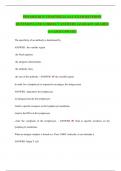
PHYSIOLOGY CHAPTER 24. ALL EXAM REVISION QUESTIONS AND CORRECT ANSWERS (ALREADY GRADED A+) (2024 UPDATE)
The specificity of an antibody is determined by ANSWER: the variable region. the fixed segment. the antigenic determinants. the antibody class. the size of the antibody. - ANSWER- the variable region. In order for a lymphocyte to respond to an antigen, the antigen must ANSWER: -depolarize the lymphocyte. -be phagocytized by the lymphocyte. -bind to specific receptors on the lymphocyte membrane. -bind to the DNA of the lymphocyte. -enter the cytoplasm of the lymphocyte. - ANSWER- bind ...
- Exam (elaborations)
- • 27 pages •
The specificity of an antibody is determined by ANSWER: the variable region. the fixed segment. the antigenic determinants. the antibody class. the size of the antibody. - ANSWER- the variable region. In order for a lymphocyte to respond to an antigen, the antigen must ANSWER: -depolarize the lymphocyte. -be phagocytized by the lymphocyte. -bind to specific receptors on the lymphocyte membrane. -bind to the DNA of the lymphocyte. -enter the cytoplasm of the lymphocyte. - ANSWER- bind ...
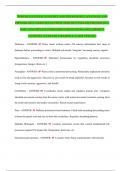
NERVOUS SYSTEM ANATOMY AND PHYSIOLOGY, ANATOMY AND PHYSIOLOGY, NERVOUS SYSTEM, NERVOUS SYSTEM PHYSIOLOGY AND ANATOMY EXAM REVISION QUESTIONS AND CORRECT ANSWERS (ALREADY GRADED A+) (2024 UPDATE)
Thalamus - ANSWER- Relay center to/from cortex. All sensory information first stops at thalamus before proceeding to cortex. Multiple sub-nuclei "integrate" incoming sensory signals. Hypothalamus - ANSWER- Maintains homeostasis by regulating metabolic processes (temperature, hunger, thirst, etc.) Amygdala - ANSWER- Plays a role in emotional processing. Particularly unpleasant emotions such as fear and aggression. Decrease in size results in being unfearful. Increase in size results in...
- Exam (elaborations)
- • 14 pages •
Thalamus - ANSWER- Relay center to/from cortex. All sensory information first stops at thalamus before proceeding to cortex. Multiple sub-nuclei "integrate" incoming sensory signals. Hypothalamus - ANSWER- Maintains homeostasis by regulating metabolic processes (temperature, hunger, thirst, etc.) Amygdala - ANSWER- Plays a role in emotional processing. Particularly unpleasant emotions such as fear and aggression. Decrease in size results in being unfearful. Increase in size results in...
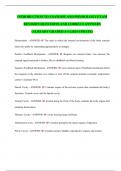
INTRODUCTION TO ANATOMY AND PHYSIOLOGY EXAM REVISION QUESTIONS AND CORRECT ANSWERS (ALREADY GRADED A+) (2024 UPDATE)
Homeostasis - ANSWER- The state in which the internal environment of the body remains relatively stable by responding appropriately to changes. Positive Feedback Mechanism - ANSWER- Requires an external brake. Can increase the original signal and push in further; like in childbirth and blood clotting Negative Feedback Mechanism -ANSWER- most common type of feedback mechanism where the response to the stimulus is to reduce or turn off the original stimulus (example: temperature control ~mai...
- Exam (elaborations)
- • 3 pages •
Homeostasis - ANSWER- The state in which the internal environment of the body remains relatively stable by responding appropriately to changes. Positive Feedback Mechanism - ANSWER- Requires an external brake. Can increase the original signal and push in further; like in childbirth and blood clotting Negative Feedback Mechanism -ANSWER- most common type of feedback mechanism where the response to the stimulus is to reduce or turn off the original stimulus (example: temperature control ~mai...
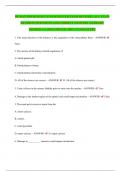
HUMAN PHYSIOLOGY END SEMESTER EXAM REVISION. ALL EXAM REVISION QUESTIONS AND CORRECT ANSWERS (ALREADY GRADED A+) (2024 UPDATE) 100% GUARANTEED
1. The main function of the kidneys is the regulation of the intracellular fluid. - ANSWERFalse 2. The actions of the kidney include regulation of A. blood plasma pH. B. blood plasma volume. C. blood plasma electrolyte concentration. D. All of the choices are correct. - ANSWER- D. All of the choices are correct. 3. Urine collects in the urinary bladder prior to entry into the urethra. - ANSWER- True 4. Damage to the lumbar region of the spinal cord could impair micturition. - ANSWER- Fals...
- Exam (elaborations)
- • 27 pages •
1. The main function of the kidneys is the regulation of the intracellular fluid. - ANSWERFalse 2. The actions of the kidney include regulation of A. blood plasma pH. B. blood plasma volume. C. blood plasma electrolyte concentration. D. All of the choices are correct. - ANSWER- D. All of the choices are correct. 3. Urine collects in the urinary bladder prior to entry into the urethra. - ANSWER- True 4. Damage to the lumbar region of the spinal cord could impair micturition. - ANSWER- Fals...
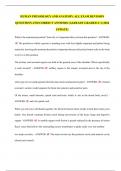
HUMAN PHYSIOLOGY AND ANATOMY. ALL EXAM REVISION QUESTIONS AND CORRECT ANSWERS (ALREADY GRADED A+) (2024 UPDATE)
What is the anatomical position? And why is it important that you learn this position? - ANSWER- The position in which a person is standing erect with feet slightly separated and palms facing anteriorly. knowing the anatomical position is important because directional terms refer to the body as if it is in this position The axiliary and acromial regions are both in the general area of the shoulder. Where specifically is each located? - ANSWER- axillary region is the armpit. acromial area i...
- Exam (elaborations)
- • 13 pages •
What is the anatomical position? And why is it important that you learn this position? - ANSWER- The position in which a person is standing erect with feet slightly separated and palms facing anteriorly. knowing the anatomical position is important because directional terms refer to the body as if it is in this position The axiliary and acromial regions are both in the general area of the shoulder. Where specifically is each located? - ANSWER- axillary region is the armpit. acromial area i...
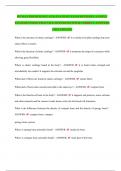
HUMAN PHYSIOLOGY AND ANATOMY EXAM REVISION. SAMPLE EXAM REVISION PRACTICE QUESTIONS WITH CORRECT ANSWERS (2024 UPDATE)
What is the structure of elastic cartilage? - ANSWER- it is similar to hyaline cartilage but more elastic fibers in matrix What is the function of elastic cartilage? - ANSWER- it maintains the shape of a structure while allowing great flexibility Where is elastic cartilage found in the body? - ANSWER- it is found where strength and stretchability are needed. It supports the external ear and the epiglottis. What kind of fibers are found in elastic cartilage? - ANSWER- elastin fibers What k...
- Exam (elaborations)
- • 6 pages •
What is the structure of elastic cartilage? - ANSWER- it is similar to hyaline cartilage but more elastic fibers in matrix What is the function of elastic cartilage? - ANSWER- it maintains the shape of a structure while allowing great flexibility Where is elastic cartilage found in the body? - ANSWER- it is found where strength and stretchability are needed. It supports the external ear and the epiglottis. What kind of fibers are found in elastic cartilage? - ANSWER- elastin fibers What k...
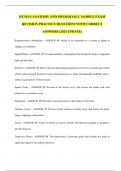
HUMAN ANATOMY AND PHYSIOLOGY. SAMPLE EXAM REVISION PRACTICE QUESTIONS WITH CORRECT ANSWERS (2024 UPDATE)
Responsiveness (Irritability) - ANSWER- Ability of an organisms or a system to adjust to changes in conditions Sagittal Plane - ANSWER- Two-dimensional, vertical plane that divides the body or organ into right and left sides Set Point - ANSWER- Ideal value for a physiological parameter, the level or small range within which a physiological parameter such as blood pressure is stable and optimally healthful, that is, within its parameters of homeostasis Spinal Cavity - ANSWER- Division of t...
- Exam (elaborations)
- • 8 pages •
Responsiveness (Irritability) - ANSWER- Ability of an organisms or a system to adjust to changes in conditions Sagittal Plane - ANSWER- Two-dimensional, vertical plane that divides the body or organ into right and left sides Set Point - ANSWER- Ideal value for a physiological parameter, the level or small range within which a physiological parameter such as blood pressure is stable and optimally healthful, that is, within its parameters of homeostasis Spinal Cavity - ANSWER- Division of t...
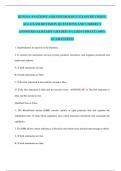
HUMAN ANATOMY AND PHYSIOLOGY EXAM REVISION. ALL EXAM REVISION QUESTIONS AND CORRECT ANSWERS (ALREADY GRADED A+) (2024 UPDATE) 100% GUARANTEED
1. Hypothalamus in superior to the thalamus. 2. It controls the autonomic nervous system, produces hormones, and regulates emotional and behavioral patterns. A. If both statements are true B. If both statements are false C. If the first statement is true and the second is false D. If the first statement is false and the second is true - ANSWER- D. The first statement is false and the second is true. Modified True or False: 1. The Blood-brain barrier (BBB) consists mainly of tight juncti...
- Exam (elaborations)
- • 39 pages •
1. Hypothalamus in superior to the thalamus. 2. It controls the autonomic nervous system, produces hormones, and regulates emotional and behavioral patterns. A. If both statements are true B. If both statements are false C. If the first statement is true and the second is false D. If the first statement is false and the second is true - ANSWER- D. The first statement is false and the second is true. Modified True or False: 1. The Blood-brain barrier (BBB) consists mainly of tight juncti...
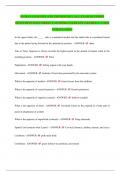
HUMAN ANATOMY AND PHYSIOLOGY. ALL EXAM REVISION QUESTIONS AND CORRECT ANSWERS (ALREADY GRADED A+) (2024 UPDATE) 100%
In the upper limbs, the _____ side is considered medial and the radial side is considered lateral due to the palms facing forward in the anatomical position. - ANSWER- ulnar True or False. Superior is always towards the highest point in the animal or human when in the standing position. - ANSWER- False Palpatation - ANSWER- feeling organs with your hands Movement - ANSWER- Includes all activities promoted by the muscular system What is the opposite of medial - ANSWER- lateral (away from th...
- Exam (elaborations)
- • 18 pages •
In the upper limbs, the _____ side is considered medial and the radial side is considered lateral due to the palms facing forward in the anatomical position. - ANSWER- ulnar True or False. Superior is always towards the highest point in the animal or human when in the standing position. - ANSWER- False Palpatation - ANSWER- feeling organs with your hands Movement - ANSWER- Includes all activities promoted by the muscular system What is the opposite of medial - ANSWER- lateral (away from th...
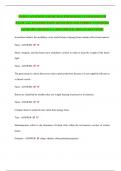
HUMAN ANATOMY AND HUMAN PHYSIOLOGY END SEMESTER EXAM. ALL EXAM REVISION QUESTIONS AND CORRECT ANSWERS (ALREADY GRADED A+) (2024 UPDATE) 100% GUARANTEED
In newborn infants, the medullary cavity and all areas of spongy bone contain yellow bone marrow. False - ANSWER- TF Short, irregular, and flat bones have medullary cavities in order to keep the weight of the bones light. False - ANSWER- TF The periosteum is a tissue that serves only to protect the bone because it is not supplied with nerves or blood vessels. False - ANSWER- TF Bones are classified by whether they are weight bearing or protective in function. False - ANSWER- TF Compact...
- Exam (elaborations)
- • 16 pages •
In newborn infants, the medullary cavity and all areas of spongy bone contain yellow bone marrow. False - ANSWER- TF Short, irregular, and flat bones have medullary cavities in order to keep the weight of the bones light. False - ANSWER- TF The periosteum is a tissue that serves only to protect the bone because it is not supplied with nerves or blood vessels. False - ANSWER- TF Bones are classified by whether they are weight bearing or protective in function. False - ANSWER- TF Compact...
